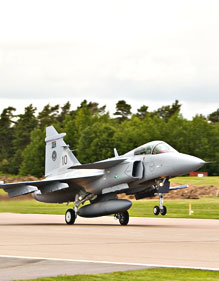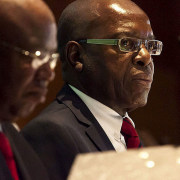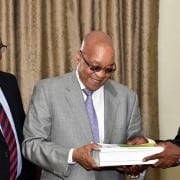|
Getting your Trinity Audio player ready...
|
 By Lee-Ann Alfreds
By Lee-Ann Alfreds
The premise was irresistible: 64 165 jobs would be created and between R104-billion and R110-billion in investment attracted in return for spending just R30-billion, plus finance costs, on arms.
So the South African government, unable to resist, duly contracted with several foreign arms companies to supply fighter jets, submarines, corvettes, helicopters and tanks in return for the much-needed jobs and investment.
But they should have remembered the adage that “nothing from nothing ever yet was born”. For it was almost immediately evident that the offsets would not yield the promised results.
For South Africa, spending a total of R70-billion on the arms deal has resulted in only 13 690 jobs created and R6-billion in investment, according to a Department of Trade and Industry audit conducted in 2012.
Titled Strategic Defence Packages Performance Review Report, the audit of 40 of 121 offset projects found that:
- Out of 24 audited projects in which arms companies had promised the creation of 56 531 jobs, only 3 815 jobs (6.7%) had materialised and that even this figure was unreliable because the audit team “could not verify if the total number of jobs reported were created and whether they were sustained or not”;
- French arms company Thales was credited with investment worth $171.2-million for a failed medical waste plant that cost them just over $1.1-million;
- German Submarine Consortiums failed to meet specified conditions, resulting in a €15.2-million shortfall in investment; and
- The failure of an entire carbon manufacturing project by BAE Systems was only discovered when the audit team asked about it.
The figures led former Trade and Industry Minister Alec Erwin to concede on the stand at the Arms Procurement Commission last month that "the policy was not a total success”.
Driving economic growth
Erwin explained that the focus of the National Industrial Participation Programme was on finding and creating opportunities for economic growth.
“We need to realise,” he said in his testimony, “the total economic context in 1999 when we were not receiving a great deal of incoming foreign investment. We were attempting to attract foreign investment to help us modernise the economy, open new markets, bring in new technology.”
But this approach goes counter to all international experience of offsets, as a paper titled Arms Trade Offsets: What do We Know? by Jurgen Brauer and J. Paul Dunne for the 8th Annual Defence Economics and Security Conference in June 2004 shows.
“South Africa was naive to expect to simply get the arms and keep the money at home as well,” they concluded in the paper. They also pointed out that while the country had trumpeted that the arms deal would generate 65 000 jobs, these would cost “R1.6 million per job, nearly 20 times the average cost per job in South Africa’s defence industry”.
Brauer and Dunne’s words should have come as no surprise to the government who had been repeatedly warned before then of the folly of relying on offsets to stimulate the economy.
In 2002, Economists Allied for Arms Reduction (EAAR) under its chairman Terry Crawford-Browne concluded in a paper that the deal was “strategically, economically and financially irrational” and should be cancelled.
Cosatu also waded in on the matter in 2001, declaring in its submission to Parliament’s Trade and Industry Portfolio Committee that a major share of the investment attracted by the arms deal would be in the defence industry which would “aggravate capital intensity, widen income inequalities by race, gender and region, do little to enhance skills development; and leave the economy even more vulnerable to international fluctuations”.
Cosatu added that it was “inappropriate to justify the arms deals in terms of job creation”.
Cosatu and EAAR’s warnings are backed by international evidence. Brauer and Dunne proved that offsets – which had been around in the 1970s – had never stimulated economic development or created new jobs. “Virtually no evidence exists that general economic development goals are ever achieved via offsets. Germany may be the exception, back in the 1950s,” the authors concluded in their 2004 paper.
They said offsets had never advanced a country’s long-term goals. “It is now quite clear that offsets do not result in arms acquisition cost reductions, that offsets do not stimulate broad-based civilian economic development, that neither substantial nor sustained job creation occurs, that almost no successful technology transfer into the civilian sector is observed, and that only limited technology transfer into the military sector occurs, often over decades and at high cost … The onus to prove otherwise lies with those who would champion the case of offsets. Regrettably, their case relies on pre-offset assertions, rather than post-offset evidence. The incentive is to exaggerate benefits and understate or ignore the costs,” they concluded.
Unfortunately for South Africans, their words have proven only too true.








